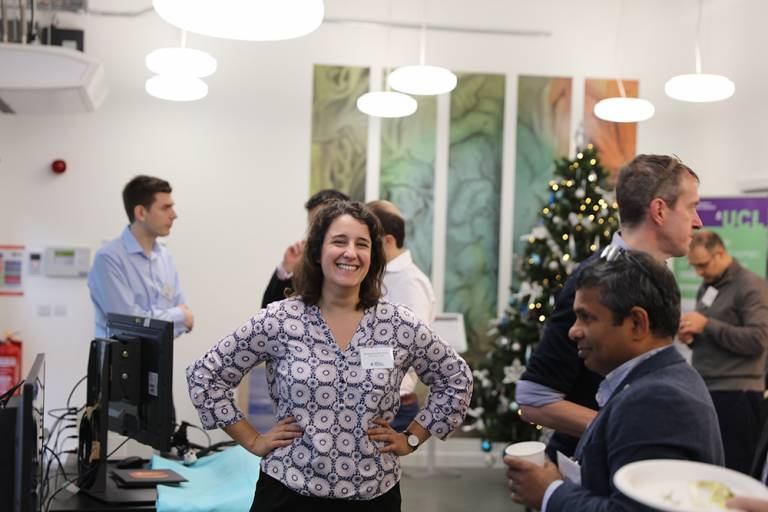Women and Girls in Science: Juana González-Bueno Puyal
11 February 2021
For the International Day of Women and Girls in Science on 11 February 2021 we're celebrating some of the amazing female researchers working at WEISS.

After obtaining her bachelor’s degree in Biomedical Engineering, Juana González-Bueno Puyal completed two master degrees focusing on medical imaging and surgical interventions. She then worked at a start-up that focused on retinal image analysis, where she used Artificial Intelligence (AI) to detect diseases from ophthalmic images.
Juana is currently a PhD student within the Department of Medical Physics and Biomedical Engineering at UCL affiliated with the Wellcome/EPSRC Centre for Interventional and Surgical Sciences (WEISS). Her PhD research is in collaboration with Odin Vision, a start-up focusing on the use of AI for early detection of diseases in endoscopic videos.
Juana's research particularly focuses on trying to close the gap between "lab" applications of AI and "real-life" derived problems when using AI in videos.
What is your favourite thing about your job?
I like a lot of aspects of my job, but I would say my favourite thing about it is that it's a constant stream of problem-solving, where I can apply novel techniques to research issues with a very specific goal in mind: end products used by patients. In the end, everything I do is to improve healthcare, which makes for a very inspiring objective.
What inspired you to work in this area?
When deciding what to study in college, I really liked biology and medicine but I knew that I had an "engineering" kind of mind. I then, kind of by luck, heard about the Biomedical Engineering degree, which was very recent at the time. It stood out as a great option for me. I have explored different fields within this, like medical robotics, but I stuck with AI because it's so versatile. I find it very exciting that most subspecialties of medicine can benefit from AI in some way!
Describe a typical day at work for you – and how has this changed during the coronavirus pandemic?
My day normally starts by planning my daily tasks. One of my tricks is to start with something easy to tick off my list to start the day properly. I then try to work on the AI models I am training at the time; I usually check experiments that were running overnight and start new experiments. I do this early on because most of my experiments take a day or two to finish. Usually, I have a couple of meetings with either my Odin colleagues or about my PhD.
The rest of my time goes mainly into coding to sort out data and tests to evaluate results, and to reading papers to keep up to date with the latest research in the field.
My daily routine hasn't changed much during the pandemic, I am fortunate that I can work remotely, and everything is based on the computer. As for the social aspect, things have changed; I really value a proper lunch break to stop and have a nice chat with people I work with, and I am missing that right now.
What has been the biggest challenge of your career so far?
The biggest practical challenge I've faced was the end of my second master's degree at Imperial College. It combined finishing a 9-month research project, with writing a thesis and the deadline for a robotics conference! It resulted in a lingering summer, very long nights and trying to keep a cool mind when things were not working. However, my constant personal challenge is convincing myself that I am competent enough for the jobs I have to do. No one ever tells you that, so it's completely up to you to believe in yourself. This has been a struggle for me and is still a challenge I work on little by little.
What has been the highlight of your career so far?
Literally every time I see something I have contributed to being used successfully for patients! It's satisfying to see how what you put effort on actually helps doctors in some situations.
What’s the best piece of advice that you have received that has helped you in your career?
Ask yourself the right questions. In the sense of not taking things for granted, always look for a reason that makes sense to you. If you work for something, it has to be for a good reason, so challenge decisions you don't agree with. This might not be helpful in the short term, but it will help in the long run to build a career you are proud of.
What advice would you give to young girls thinking about a career in science?
If that's what you want to do, go for it. There is nothing stopping you! If you are unsure, seek to talk to someone in the field. In my experience, everyone is happy to have a chat to talk about their experience and help out.
 Close
Close

